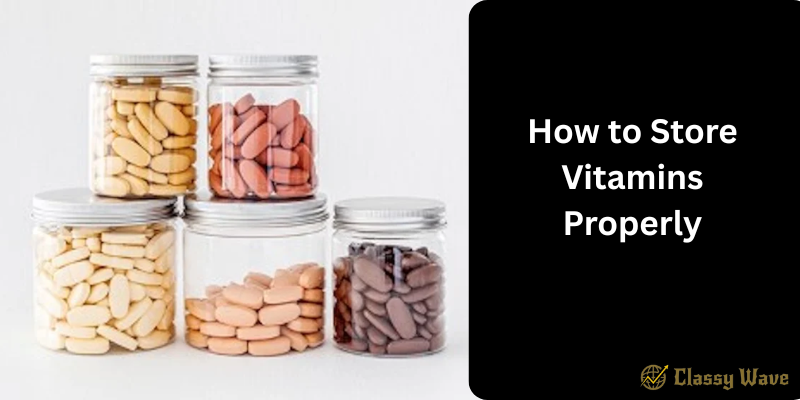How to Store Vitamins Properly | Classy Wave
You’ve spent money on quality vitamins and supplements — but did you know that how you store them directly affects their potency and shelf life? Vitamins are sensitive to light, heat, air, and moisture. If stored improperly, they can lose their effectiveness long before the expiration date. In this article, we’ll walk you through the best ways to store vitamins properly to ensure they stay fresh, effective, and safe for daily use.
Why Proper Vitamin Storage Matters
Just like food, vitamins can degrade over time if exposed to the wrong conditions. When vitamins lose potency, you won’t get the full health benefits they promise — meaning your immune support, energy boost, or nutrient intake might not work as expected.
Proper storage helps:
- Maintain nutritional value
- Prevent moisture damage
- Extend shelf life
- Ensure safety and effectiveness
Understand What Affects Vitamin Stability
Before we discuss storage methods, it’s important to understand what causes vitamins to degrade.
The main culprits are:
- Heat: High temperatures can break down active ingredients.
- Light: UV rays from sunlight damage light-sensitive vitamins like A, C, D, and B-complex.
- Air: Oxygen exposure can oxidize and reduce potency.
- Moisture: Humidity can cause tablets or capsules to clump, melt, or grow mold.
Ideal Temperature for Storing Vitamins
Most vitamins should be stored at room temperature (between 15°C and 25°C or 59°F and 77°F). Keep them in a cool, dry place — away from windows, stoves, or bathrooms.
Avoid storing vitamins in hot cars, near radiators, or inside kitchen cabinets above the stove, as these areas tend to trap heat and moisture.
Avoid Bathroom Storage
Many people store their supplements in the bathroom medicine cabinet — but that’s actually one of the worst places to keep them. The constant humidity from showers and temperature changes can destroy their quality over time. Instead, store them in a dry area like your bedroom dresser or pantry.
Keep Vitamins Away from Direct Sunlight
Sunlight can quickly degrade certain vitamins, especially those containing natural oils or probiotics. Always keep bottles in opaque containers or store them in a dark cupboard. Never leave them on window sills or countertops exposed to sunlight.
Use Airtight Containers
Exposure to air can reduce vitamin potency through oxidation. To prevent this:
- Always close lids tightly after use.
- Keep vitamins in their original container — it’s designed to block light and air.
- Avoid transferring them to clear or non-airtight jars, even if they look prettier.
Avoid Refrigerating Unless Specified
Not all vitamins belong in the refrigerator. In fact, excess moisture inside the fridge can damage capsules or tablets. Only refrigerate if the label clearly says so — this usually applies to probiotics, fish oil, and certain liquid vitamins that require cold storage to maintain live cultures or freshness.
Separate Different Vitamins
Mixing different vitamins in one container might seem convenient, but it can lead to cross-contamination or moisture transfer. Keep each supplement in its original bottle to preserve its unique ingredients and prevent unwanted reactions.
Check Expiration Dates Regularly
Even when stored correctly, vitamins don’t last forever. Always check expiration dates before consumption. If the color, smell, or texture has changed, it’s safer to discard them. Expired vitamins might not harm you, but they won’t provide the intended benefits either.
Keep Away from Children and Pets
Store vitamins out of reach of kids and pets. Some gummies or flavored supplements look like candy, which can lead to accidental ingestion. Use child-proof containers and high shelves for safety.
Store Liquid Vitamins Differently
Liquid vitamins are more sensitive than capsules or tablets. Store them in a cool, dark place and tightly seal the bottle after each use. Shake well before consumption and avoid contamination by not touching the dropper or cap with your mouth or hands.
Traveling with Vitamins
When traveling:
- Keep vitamins in their original packaging.
- Store them in your carry-on bag (not checked luggage) to avoid extreme temperatures.
- Use a small pill organizer only for short trips and away from direct sunlight.
Signs Your Vitamins Have Gone Bad
You’ll know it’s time to throw out your vitamins if you notice:
- Foul or unusual odor
- Change in color or texture
- Clumping or softening
- Mold or powder residue inside the container
If you see any of these, don’t take the risk — it’s best to replace them.
Bonus Tip: Use Silica Gel Packs
Those tiny silica gel packets that come in vitamin bottles help absorb moisture. Don’t throw them away! They help keep the contents dry and stable. Just make sure they stay inside the bottle and out of reach of children.
Conclusion
Proper vitamin storage isn’t complicated — it’s all about protecting them from heat, light, air, and moisture. Keep them in their original containers, store them in a cool, dry place, and check expiration dates regularly. By following these simple tips, you’ll make sure your vitamins stay as potent and effective as the day you bought them.







